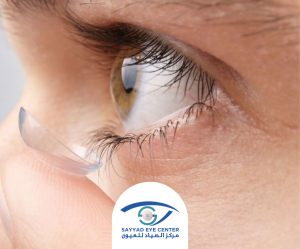
Contact Lenses: Types and the Importance of Proper Hygiene
Contact lenses are a popular option for vision correction and enhancing aesthetic appearance, providing a convenient alternative to eyeglasses. However, using contact lenses requires strict adherence to hygiene and care practices to avoid potential health issues that could affect the eyes. In this article, we explore the types of contact lenses, their benefits, and essential tips for maintaining their cleanliness and eye health.
Types of Contact Lenses
Soft Contact Lenses:
These are widely used and made from flexible materials that offer comfort throughout the wearing period. They are available as daily, monthly, or extended-wear lenses.
Rigid Gas Permeable (RGP) Lenses:
Made of hard materials, these lenses provide clearer vision for certain conditions such as keratoconus.
Cosmetic Lenses:
Designed to change eye color or enhance aesthetic appearance, some also offer vision correction.
Specialty Medical Lenses:
Custom-made for treating specific conditions such as dry eye or post-surgical recovery.
Benefits of Contact Lenses
- Correct vision problems such as nearsightedness, farsightedness, or astigmatism.
- Provide a full field of vision without the frames of glasses.
- Enhance aesthetic appearance with a frameless look.
- Convenient for use during sports or physical activities.
Contact Lens Care: Tips for Maintaining Hygiene
Wash Hands Thoroughly:
Always wash and dry your hands before handling contact lenses to prevent transferring germs to your eyes.
Clean Lenses Daily:
Use the designated cleaning solution for your lenses, and avoid water or saliva, as they may contain harmful bacteria.
Avoid Sleeping with Lenses:
Unless designed specifically for overnight wear, sleeping with lenses increases the risk of infection.
Change Storage Solution Daily:
Replace the old storage solution daily to prevent bacterial and fungal buildup.
Check Lens Expiry:
Follow the recommended usage duration for your lenses and replace them on time.
Regular Eye Check-ups:
Visit your eye doctor regularly to ensure your eye health and determine the most suitable lenses for your needs.
Risks of Improper Contact Lens Use
Eye Infections:
Dirty lenses can cause serious infections like bacterial keratitis.
Dry Eye Syndrome:
Improper use of lenses may increase dryness and discomfort.
Corneal Ulcers:
Poor hygiene or overuse of lenses can lead to serious complications that may affect vision.
Our Services in Contact Lens Care
At our medical center, we provide expert consultations to help patients select the right contact lenses based on their health and needs. We also offer detailed guidance on how to use and care for contact lenses to ensure eye safety and health.
Because your eye health is our priority, we are here to help you make the right choices for your vision care. Contact us today to schedule an appointment or consult our specialists.

